
By Ernst Lamothe Jr.
It’s a condition that arises gradually but can cause tremendous pain and affect quality of life. Chronic kidney disease, also called chronic kidney failure, involves a measured loss of kidney function. A kidney’s function involves filtering wastes and excess fluids from the blood, which are then removed in your urine. Advanced chronic kidney disease causes dangerous levels of fluid, electrolytes and wastes to build up in your body.
Physician Antoine Azar, who is part of the Nephrology Associates of Syracuse, a private kidney specialist medical practice that has been serving the community for more than 44 years, discusses five aspects of kidney disease.
1 — Kidney issues for youth and adults
Some common kidney issues that affect children and adults are kidney stones, kidney infections, acute kidney injury and chronic kidney disease. Chronic kidney disease is especially important because more than one in seven US adults — and as many as nine in 10 adults — have the condition.
“Common kidney issues in the early stages of the disease are typically not noticed by patients. As the disease progresses, individuals may notice foamy urine and they wake up at night more often to go to the bathroom,” said Azar. “Other common kidney issues may include anemia and blood pressure-related issues including headache, dizziness and kidney stones.”
2 — Misconceptions
There are various misconceptions when it comes to the condition. Sometimes people consider the word chronic and believe it means severe. In actuality, it means long-term. Chronic kidney disease processes slowly and people may not notice for some time until their kidneys are seriously damaged.
“People say kidney disease is symptomatic, meaning that you will know if you have kidney disease. This is false and unfortunate,” said Azar. “Many people are unaware of kidney disease. Chronic kidney disease has been called the silent disease because most people experience no symptoms in the early stages of the disease. That is why it is important to be aware of your risk factors.”
Another myth about kidney disease is that if you are at risk there is nothing you can do about it.
“The earlier a person is assessed for kidney disease, the sooner an individualized care plan can be implemented to quickly take action to slow the progression of the disease and prevent further damage as much as possible,” he said.
3 — Kidney disease signs
There are very few signs of early or moderate chronic kidney disease that only blood or urine testing will show. In very advanced cases, people may experience the symptoms of toxin buildup, which may include confusion, loss of appetite or foul taste, nausea and vomiting, or itching. They may also notice the effects of fluid accumulation, including swelling of the legs and shortness of breath.
“There are mostly no signs or symptoms in the early stages of kidney disease. Common early symptoms of kidney issues include urinating more or less than usual, fatigue and weakness, sleep problems, loss of appetite, muscle cramps, nausea, and vomiting, which happens at advanced stages,” said Azar. “Chronic kidney disease slowly damages the kidney over time which means that the kidneys’ ability to filter wastes from the body worsens. Some other common kidney issues may include kidney stones.”
4 — Family history
Some kinds of kidney disease are directly inherited on a single gene, like polycystic kidney disease. Other kidney diseases come about as a combination of many genes in addition to environmental factors, which also tend to run in families.
“Two of the main causes of chronic kidney disease are diabetes and high blood pressure, which are two conditions that can be inherited. A family history of kidney disease, such as a family member being on dialysis may indicate that an individual will have a predisposition to possibly develop kidney disease,” said Azar. “Some cystic kidney diseases can be hereditary. It is extremely important for people who have diabetes, high blood pressure, heart disease, obesity or a family history of kidney disease to know their risk of developing kidney disease.”
5 — How does dialysis work
Dialysis is a procedure that replaces kidney function in people with kidney failure. It doesn’t fix the kidneys themselves. Dialysis gets rid of the extra fluid. You can get dialysis treatments in a number of different ways: blood dialysis or belly dialysis (peritoneal dialysis), in a dialysis center or at home. They all serve the same purpose and work equally well.
“When an individual’s kidneys no longer function, this is referred to as end-stage renal disease or kidney failure. Dialysis is one treatment option for kidney failure whereby an access point in the person’s body is established to allow the person’s blood to be removed, filtered to take away waste and excess fluids and then the clean blood travels back into the person’s body. Dialysis does not improve kidney function; it is a procedure to clean the person’s blood when their own kidneys are not able to do it,” he said.

